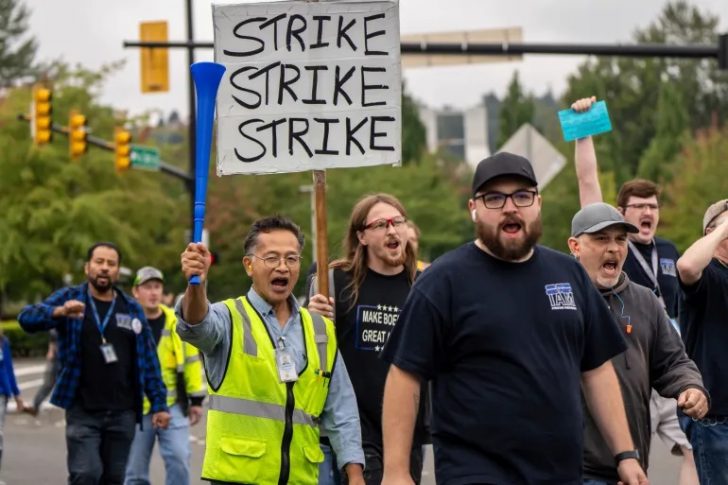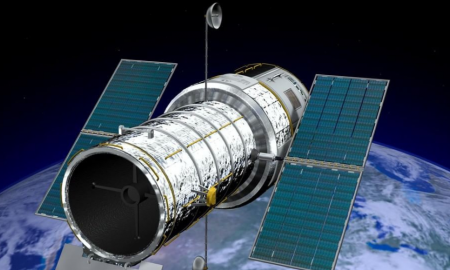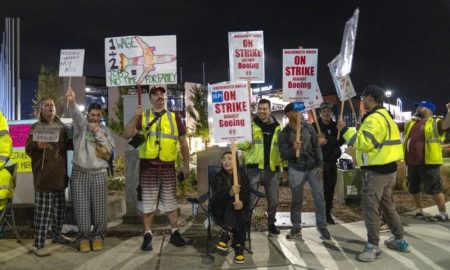
Boeing Strike Prolongs As Workers Reject 35% Pay Raise & Demand ‘Lost’ Pension Plan

The Boeing strike, initiated by over 33,000 machinists on September 13, 2024, has brought one of the world’s largest aircraft manufacturers to a halt. As union members push for improved benefits and a return to a traditional pension, Boeing’s latest proposal, which included a 35% pay increase over four years, was rejected by a significant margin.
With 64% of the International Association of Machinists and Aerospace Workers (IAM) voting against the offer, it seems like that pay alone won’t end the strike. The workers’ demands go deeper, reaching into a decade-long debate over pensions and financial security.

E News / A decade ago, Boeing moved away from its traditional pension plan, replacing it with a 401(k) retirement model.
This change remains a sore point for workers, many of whom feel the 401(k) model leaves them vulnerable to market risks, unlike the stability of a pension. According to the IAM union, Boeing’s pension switch was not a simple update but a strategic decision that put financial pressure on employees. The union argues that the original pension plan was sacrificed in 2014 after Boeing reportedly threatened to shift production elsewhere. This leaves workers feeling as if they have little choice.
The Pay Raise Proposal Doesn’t End the Boeing Strike
When Boeing offered a 35% pay rise over the next four years, it seemed like a generous offer. However, the proposed pay bump wasn’t enough to satisfy the striking workers. 64% of IAM members rejected the proposal, making it clear that salary alone was not the issue driving their resolve. For these machinists, higher pay without a secure retirement plan only goes so far.
IAM’s response to the proposal underscores that the Boeing strike is not about one-off wage increases. Instead, it is about a holistic approach to worker benefits. The machinists see pensions as a guaranteed safeguard, ensuring a reliable income after years of labor.
Pensions Are at the Heart of the Ongoing Boeing Strike
At the heart of the Boeing strike is a fundamental question about retirement: Pensions or 401(k) plans? For machinists, the traditional pension provides a stable, predictable income that the 401(k) model can not replicate. The IAM union has consistently argued that 401(k) plans are subject to market risks, making retirement income unpredictable.

Eca / Machinists view the pension plan as a mark of respect for their years of dedicated work and a sign of Boeing’s commitment to their future. Without this assurance, many workers feel that their years of service are undervalued.
However, this is not the first time a labor dispute has centered around retirement benefits. The Boeing strike has drawn attention to a broader trend where corporations are moving away from pensions, often replacing them with alternatives that don’t guarantee the same security.
The State of Negotiations and Why the Strike Continues
The Boeing strike is now in its seventh week, and despite several rounds of negotiations, the two sides remain far apart on the issue of pensions. Boeing’s offer of a 35% wage increase was intended as a compromise, but the machinists’ refusal to accept it underscores the gap in priorities.
The IAM union is resolute, maintaining that its members deserve the pension plan they were promised before 2014. Boeing, on the other hand, appears committed to the 401(k) structure, viewing it as sustainable for the company’s long-term goals.
The negotiation stalemate has prolonged the strike, as neither side is willing to yield on what they consider core principles. Boeing’s reluctance to reinstate the pension plan reflects a corporate strategy focused on maintaining financial control, while the union’s persistence highlights a demand for respect and long-term security.
More in Business
-
`
What Quarters Are Worth Money? Tips to Identify Valuable Coins Today
In coin collecting, certain quarters stand out not just for their face value but for their potential worth, much beyond that....
June 21, 2024 -
`
How Does the Hubble Telescope Work and Where Is It?
Have you ever gazed at the night sky and marveled at the twinkling stars and wispy clouds of gas and dust?...
June 15, 2024 -
`
5 Savings Accounts That Will Earn You the Most Money in 2024
In 2024, choosing the right savings account is more critical than ever. With the array of options available, knowing which savings...
June 5, 2024 -
`
The Complete Relationship Timeline of Taylor Swift & Travis Kelce
When you think of unlikely couples, Taylor Swift and Travis Kelce might not be the first pair that comes to mind....
May 29, 2024 -
`
What is Business Administration and What Opportunities Does it Offer?
In today’s bustling world of commerce and industry, the term “business administration” often looms large, yet its true essence remains shrouded...
May 22, 2024 -
`
What is AI? Exploring the World of Artificial Intelligence
In today’s rapidly evolving technological landscape, the term “Artificial Intelligence” (AI) has become a buzzword that sparks curiosity, speculation, and even...
May 16, 2024 -
`
How Many Jobs Are Available in Real Estate Investment Trusts? Exploring Career Opportunities
Are you seeking a career path with a blend of financial savvy and a knack for the real estate market? Look...
May 9, 2024 -
`
The Staggering Net Worth of the Richest Podcaster Joe Rogan in 2024
Joe Rogan has become a household name, largely due to his immensely popular podcast, “The Joe Rogan Experience.” With a blend...
April 29, 2024 -
`
What Are Routing Numbers & Do Credit Cards Have One?
When managing your finances, understanding the various numbers and terms associated with your bank accounts and credit cards is crucial. A...
April 24, 2024















You must be logged in to post a comment Login